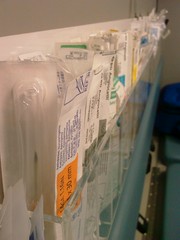
I was listening to the
EMS garage podcast #27 the other night, when they got into a heated discussion about Columbus, OH looking to be a
Basic Life Support (BLS) only service. San Antonio Fire Department in Texas has just started running six
BLS only ambulances in addition to their thirty two
ALS (Paramedic) ambulances.
I work for a private ambulance service in Kentucky. I am a new paramedic with only a few months under my belt on the streets. My ambulance service does not have any 911 contracts, but we have many with nursing homes and rehabilitation centers around town. Today (like many days) was extremely slow, and the three paramedic trucks were relegated to dialysis runs and doctor appointments, all of them
BLS in care level. I began to think are paramedics really needed in urban service areas?
The OPALS Major trauma study as reviewed by Dr. Keith Wesley on
JEMS.com showed that
ALS intervention in major trauma patients had little to no benefit to survivability. Also it stated that when a trauma patient had a Glasgow Coma Scale (
GCS) score of less then 9 and
ALS intervened, the mortality rate INCREASED. Yes, this is only one study, but more and more studies are arriving showing that
ALS procedures do not increase survivability for the patients. Trauma is the realm of surgeons (paramedic students are told that Trauma is a surgical disease, and the only definitive care is surgery), control the bleeding, apply oxygen and increase the diesel flow exponentially (all
BLS skills by the way).
Cardiac Arrest, the American Heart Association (AHA) has been promoting more high quality CPR (cardiopulmonary resuscitation) and less time interrupting chest compressions while trying
ALS interventions.
Ok, I can hear the pundits (and old school medics) but we NEED an IV line and we NEED an
endotracheal tube to secure the airway! Well, modern science along with a few industrious people have come up with several blind insertion airway devices, like the venerable
Combitube or the King Airway. Both these devices are
BLS level skills in many states (the number is growing and it should). Any decent paramedic, would not remove one of these devices as long as adequate ventilation are being performed (and you can even add
capnography). What about electrical therapy? Semi-automatic External Defibrillators (
SAED or
AED)
BLS skill. There is even a thought from Dr. Bryan
Bledsoe in the recent
JEMS magazine about giving too much oxygen. Summery, high quality chest compressions, not hyper oxygenation and a king airway with a bag valve mask (on room air of course), all
BLS level skills.
Stroke (
Cerebrovascular Accident,
CVA), unless you work for a service that allows the administration of
tPA (Tissue
plasminogen activator) , you are just a glorified
BLS transport truck trying to get the patient to a stroke center within the three hour time frame. Sure you can start and IV, but can you provide definitive care for that patient? If you could why would you be transporting them in the first place? Treat and release (yes I know this is extremely unlikely that a paramedic could EVER treat and
release a
CVA, but the question is still valid).
Asthma/
Anaphylaxis, again modern science has given us the
Epi Pen auto injector that many
BLS services are now carrying. Even in the Metro are I live,
BLS trucks administer
albuterol nebulizer treatments. Then just transport them to hospital of choice.
Congestive Heart Failure (
CHF), what about that smart ass? Again more medical directors are adopting protocols that involve less invasive treatments in the field, like
CPAP (Continuous positive airway pressure). A
BLS ambulance is trained to listen to lung sounds, they can identify
ralse (crackles) and use the
CPAP, during transport to the hospital of choice. Diuretic medications are also being studied closely, and some doctors want to stray away from
excessive use of
lasix in the field.
Angina and chest pain,
Nitro glycerine (
NTG) and
asprin (ASA) along with a little oxygen and get thee to a hospital. There is talk in the EMS community of reducing the use of morphine for chest pain. Oh, you want to address the twelve lead ECG stuff also? Much of 12 lead ECG
transmitting to
ER's in my area is still in the pilot program stages. Yes, this can reduce door-to-balloon time but the study in my metro is still under way. If I can get a patient to the ER under 30 minutes and I did not transmit an ECG to the hospital is the door-to-balloon time really that much greater? We all act like transmitting
ECGs to the ER is something new, but as I recall Johnny & Roy were doing that in the 1970's.
I believe that if your transport time is less than 30 minutes to definitive care in a hospital, then you really don't
need paramedics in your service. Maybe I am just a new medic and I don't know what I am talking about, but the studies are out there. I became a medic to help people, and I find that I am just another ambulance driver. You can send your hate mail here: joelneild@gmail.com but you will only get a response if you can format a sentence correctly and use proper
grammar.




